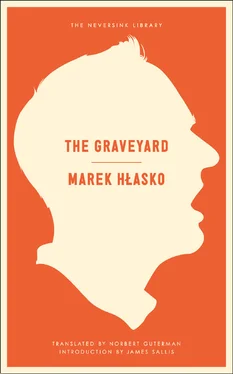“A bit crowded,” said the man behind the desk. He cast a quick glance at Franciszek. “But there’ll be plenty of room for him too.”
“What temporary?” Franciszek asked.
“Take your things off,” the sergeant said. He turned again, and Franciszek saw only his broad back crossed by a diagonal leather strap.
“What?” he asked.
“Didn’t you hear me, Citizen? Take your things off, please. Your belt, scarf, shoelaces, and papers. And empty your pockets.”
“We’ve given you the papers,” said the corporal who had escorted Franciszek to the station.
“But why, damnit?” Franciszek asked.
The sergeant turned and looked at Franciszek with impatience. “What do you mean ‘why’? You’re under arrest,” he said peremptorily. “Or do you think we’ve brought you here just to shake your noble hand?”
The three of them laughed uproariously. Franciszek was so startled that he did not even notice their laughter. “Under arrest?” he said. “What for?”
“Don’t you know?”
“No,” Franciszek said resolutely. He came close to the railing, and put his hands on it. “I do not know. I remember that I somehow flew off the handle, but it seems to me that’s no good reason for keeping me locked up all night.”
“No good reason?” the sergeant drawled. “And what about the things you shouted? Don’t you remember what you shouted?”
The three of them stared at him, and Franciszek suddenly shriveled. For a moment they were all silent; the man asleep on the bench was breathing heavily.
“No,” Franciszek said after a while. He passed his hand over his forehead. “I don’t remember.”
“Well, then, we’ll talk after you’ve sobered up and can remember everything exactly,” said the sergeant. “Then you’ll sign a statement, and we’ll let you go.”
“Couldn’t that be done now?” Franciszek asked.
The corporal at the desk laughed. “How can you make a statement,” he inquired, “when you say yourself that you don’t remember anything?”
“What do you mean? I remember everything.”
“Everything?” asked the sergeant mockingly.
Franciszek’s face fell. “Everything,” he said in an uncertain voice, looking at the sergeant pleadingly. “Everything — except the exact words I shouted. I can’t repeat them exactly, but if you remind me …” He made a vague gesture with his hand.
“We’ll remind you in the morning,” said the sergeant. “It’s those words we’re interested in. And now, that’ll be enough, Citizen. Please hand us your belt, shoelaces, scarf, and everything you have in your pockets.” He cast a reproachful glance at Franciszek, and added gently, “Don’t make it hard for us, Citizen.”
“But—” Franciszek began.
The corporal behind the railing banged his fist on the desk. “Do you or do you not understand human speech? Hand over your things, and don’t talk so much, or you’ll be sorry!”
With trembling hands Franciszek began to remove his things from his pockets and put them on the desk — a handkerchief, a comb, a little mirror, a fountain pen, and a pencil. The corporal made a list of them and thrust them into an enormous gray envelope; on it he wrote in clumsy letters, “Franciszek Kowalski, 3.28.1952.” He went to a cupboard and opened it. Out of the corner of his eye Franciszek noticed that there were many such envelopes, placed evenly one beside another, indistinguishable. The corporal closed the cupboard and sat down again at the desk. He handed Franciszek a receipt and, pointing to the place with his finger, said dryly, “Sign here.”
Franciszek signed and gave him back the paper. “I am a former partisan,” he said bitterly. “Never in my life have I done anything I could be ashamed of.” His words came out with increasing speed. “Someone will pay for this mistake. It’s unheard-of that a man should be locked up just for taking a few glasses of vodka. You must believe me; this is the first time in my life I have ever been in a police station.”
“That’s fine,” the corporal said without even looking at him. “But there is a first time for everything.”
The sergeant said, “And now, please, follow me.”
Holding up his trousers, Franciszek followed him. They walked along a filthy dark corridor lit only by small wire-encased bulbs hung near the ceiling. Then the sergeant opened a door, and said, “Here.”
Franciszek walked in; he wanted to say something, but at that moment the door banged shut. He stood still for a moment, listening; his thoughts could not catch up with the pace of events. He leaned his hand against the wall, and withdrew it in disgust: the wall was rough, cold, and clammy. The sergeant’s footsteps died away.
UNTIL THE MOMENT WHEN HE HEARD THE DOOR bang shut, Franciszek had not clearly realized his position: everything had happened too quickly, in an atmosphere of hysteria that didn’t seem quite real. Not until he had been in the stuffy cell for a while, and his eyes had become sufficiently accustomed to the half darkness to distinguish the people lying on the floor, did he realize that he would irrevocably remain a prisoner for several hours. At first this realization threw him into a rage, and he pounded and kicked the door; but, as no one responded, he soon grew tired; a little later he was even amused. “The whole thing is ridiculous,” he thought. “Nothing but a stupid mistake; somebody will have to pay for it later.”
Calming down, he examined the cell. Around him, on the floor and on the two benches, people were sleeping. They seemed shriveled, comically small. They slept in all sorts of positions, strangely doubled over, with legs pulled up to their chins; and a giant of a man, whose bald head gleamed faintly in the dim light, slept standing, his hands clinging to an iron netting on the wall. Franciszek tried to sit down on the floor; but as he squatted he suddenly felt a pair of legs being pulled from under him, and someone said hoarsely, “Watch what you’re doing, damn you!”
Franciszek got up, and once again took two uncertain steps, trampling on arms and legs; their owners jerked them back with sudden froglike motions. The air was heavy with the smell of stale alcohol; even now, when they were asleep, their mouths drooling, it was obvious that almost everyone in the cell was dead drunk. “At least, this is my first time,” Franciszek thought, and the reflection comforted him. “After all, one out of every five men is always drunk. It must be discouraging for the police. I was a bit tight, I made too much noise, and that was the cause of all the trouble. Nothing to be upset about. Come on, pull yourself together. You’re getting to be a nervous wreck; you’re petering out, and it’s all because you’re tired. You shouldn’t have drunk all that vodka; that’s why you behaved like a bum in the street. I suppose all of us have to play hooky every now and then, no matter how old we are.” At that moment he felt almost grateful to the police for having brought him here, to this dark cell, filled to the last inch with drunks, thereby teaching him a bitter lesson. “Yes, you stupid old bum, this will teach you,” he thought, clenching his fists with rage.
At last he found a bit of free space, and sat down on the cold concrete, resting his chin on his knees. “You’ve got what you deserve, you fool,” he said to himself. “You could have slept in a comfortable bed, under a warm blanket; you could have had a glass of tea with lemon, and you have only your own stupidity to thank, old man, for having to spend the night curled up like an embryo. You’ll be a fine-looking mess when they come to let you out.”
Someone beside him suddenly wakened, sat up with a groan, yawned widely, and began to rub his eyes, all the while grumbling like a bear. Then he turned an indistinct face toward Franciszek. “Captain, do you happen to have a cigarette?” he asked.
Читать дальше






![Ричард Деминг - Whistle Past the Graveyard [= Give the Girl a Gun]](/books/412176/richard-deming-whistle-past-the-graveyard-give-t-thumb.webp)


